No traveller in their right mind would skip Vietnam’s Mekong River Delta. The colourful collection of towns sprinkled along the banks of the Mekong River are blessed with dazzling blue skies, brimming with exotic fruits, and dotted with markets, temples and colonial-era mansions. It’s a place to nap in a hammock or drift downstream in a sampan. It’s where you’ll have your most memorable meals in Vietnam. And of course, it’s where you’ll meet the warmest Vietnamese around, as well as ethnic minorities who have made their homes on the water. Here are five destinations in the Mekong Delta for modern-day explorers.
Can Tho
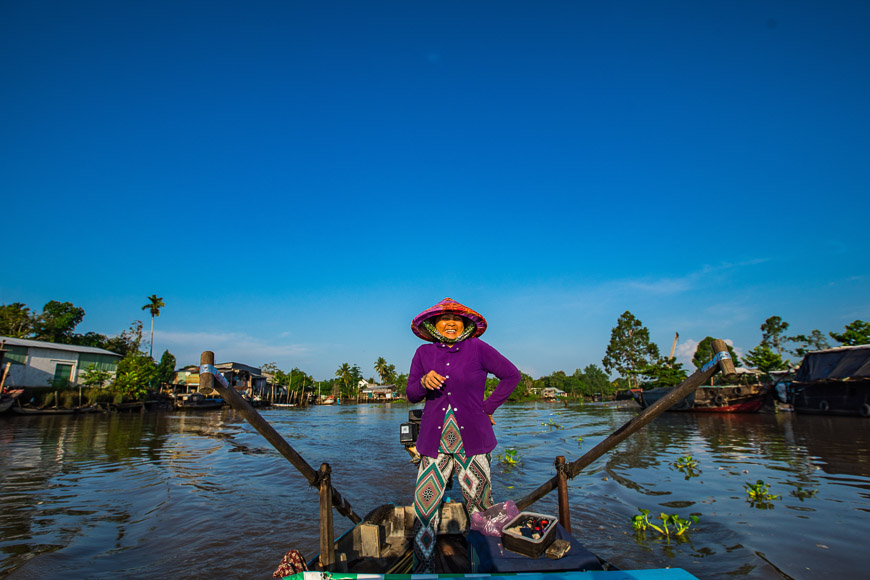
Can Tho is an ideal base for your first visit to the Delta. Here you have a real taste of Delta life: days on or near the water, laid-back vibes, and mouthwatering food. Can Tho is actually a big city -- the fourth largest in Vietnam -- yet it feels relaxed. Take a short tour on a motorcycle for a glimpse of the islets all around. Under the shade of banana and guava trees, you’ll pass fish ponds, fruit orchards, and canals. Can Tho is surrounded by a system of sleepy canals. For a small fee you can hire a rowboat for a few hours to tour these waterways, stopping at small workshops to see how rice paper and noodles are made by hand. Several rustic hotels and homestays in Can Tho offer rooms where you can relax with blissful views of the water.
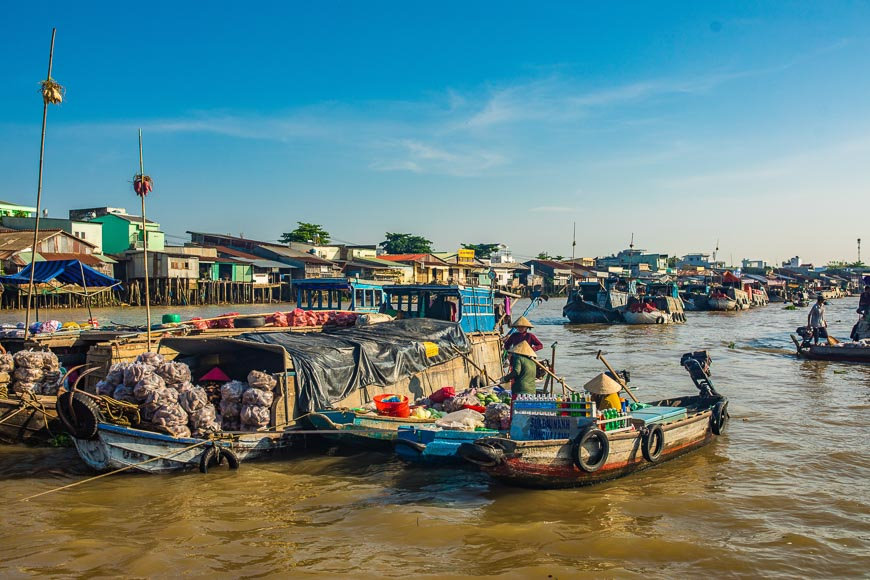
Of course, many people come to Can Tho to see the Cai Rang Floating Market. The market is a riveting spectacle of colour and activity that gets started around five in the morning. Be sure to be on a boat by 6am so you can watch the mist drift off the water, and catch the market action during peak hours. Weighed down with loads of fruit fresh from the farm, boats of all sizes do business on the caramel-coloured river. Pomelos, pineapples, and durians among others are traded by the sackful from boat to boat. Small rowboats navigate between the bigger boats, selling coffee, snacks, and noodles. Sidle up to a hu tieu vendor for the best breakfast in Can Tho: a steaming bowl of tapioca noodles, sliced pork, and aromatic herbs.
TIP: If you enjoy floating markets, ask your hotel about smaller floating markets around Can Tho where you can get a close look at the fruits sold by the farmers.
Cai Be
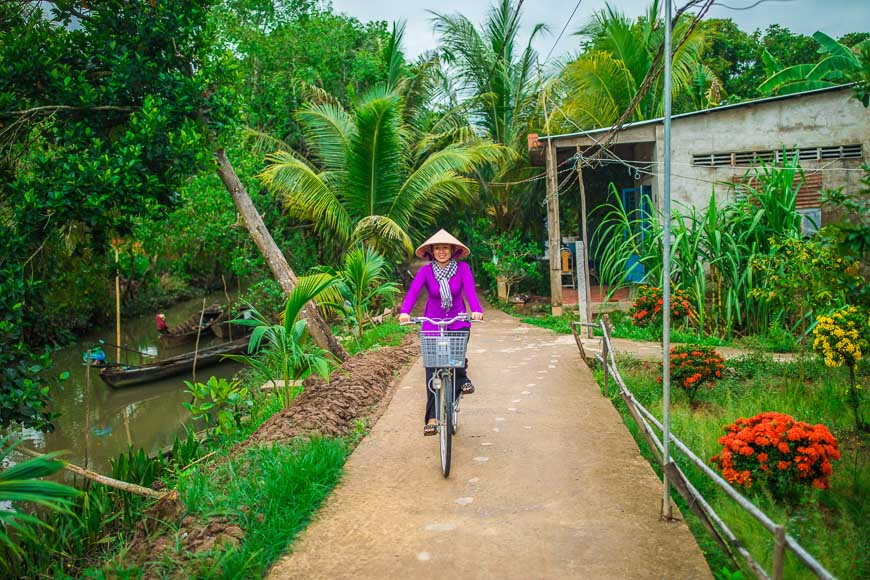
Not many travellers come to Cai Be, but that may be why this little town feels so approachable and authentic. The star of Cai Be District is Tan Phong Islet -- a lush drop of earth enveloped by the Tien Phong River. Ferry rides are a part of every day in the Mekong Delta, and you’ll take a short but interesting ferry ride to reach the islet. Tan Phong is crisscrossed with canals and planted with fruit trees. Most residents here are farmers, who tend rambutans, mangosteens and other tropical fruit trees in plots around their houses. The best way to see the islet is to take a sampan, or ride a bicycle down the narrow lanes. You’ll find yourself immersed in flowering foliage and see firsthand how the locals live in this part of Vietnam.
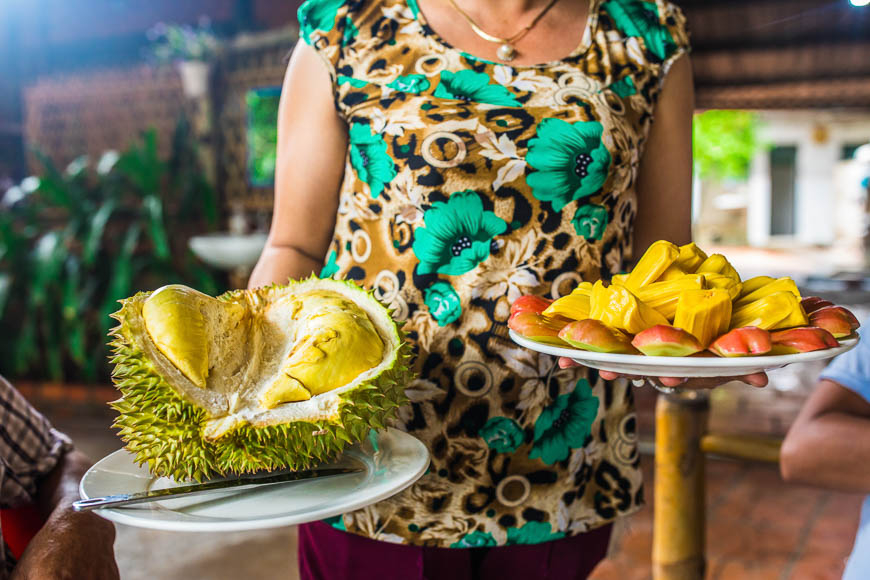
Back on the mainland, the markets in Cai Be town go into full swing at first light. Children ride to school, the sun glistens off the water on the ferry crossings, and the flags of the Cai Be Church flutter in the river breezes. Go by bicycle to see the Cao Dai temple, and to explore the market on your own. If you run out of things to do, the best thing you can do in Cai Be is eat. Eat ginger candy with peanuts, eat fluffy banh mi with chili sauce, eat slippery banh canh noodles in fish broth, and eat all the just-picked, sun-kissed fruits you are offered. If you need to, you can always have a nap in a hammock after -- it’s what the Vietnamese would do!
Chau Doc
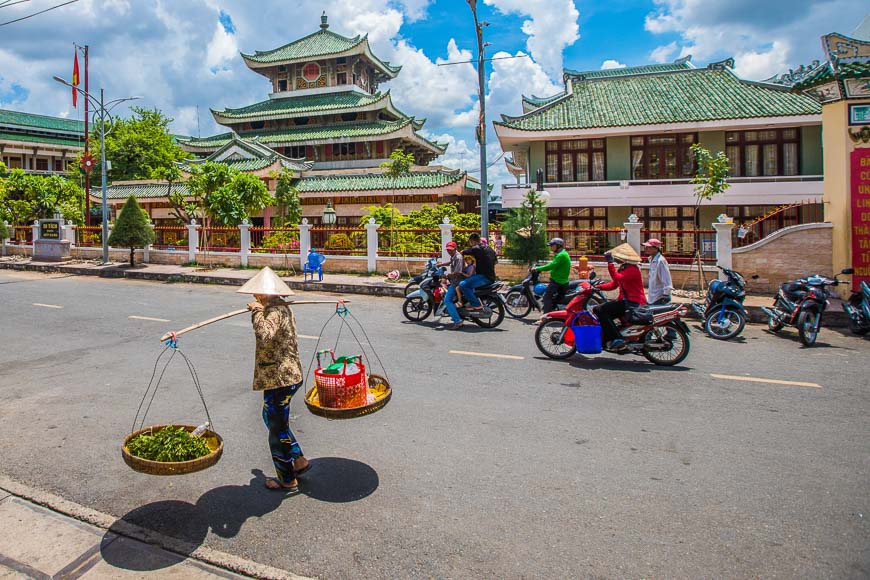
Chau Doc is a border town with all the melded influences and wonderful sights, sounds and smells of a border town. The Hau River -- sometimes called the Bassac River -- flows directly in front of the town. River boats bring produce from far away to sell at Chau Doc’s sprawling market. The market is a kaleidoscope of multicultural trade. In the wet market, flowers, fermented fish, palm nuts, and tamarinds are best-sellers. Elsewhere, shophouses with meticulously painted signs deal in everything from gold to plastic slippers. The sidewalks outside the market are where you’ll find the best Chau Doc-style bun ca. This turmeric-tinted noodle soup is made with garlic and fermented fish paste, river fish, fresh rice noodles, banana blossoms, bean sprouts and crunchy điên điển flowers. It’s a perfectly balanced meal that’s only made this way in the Mekong Delta.
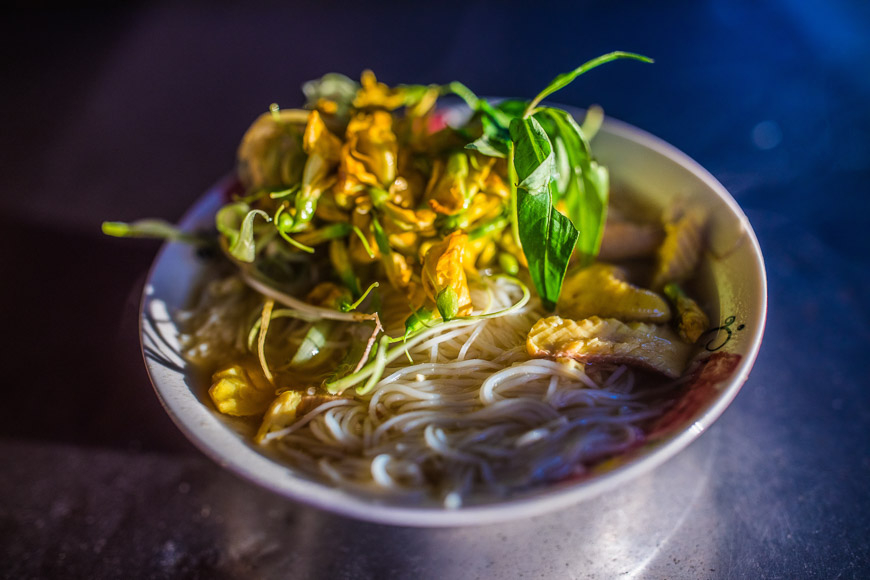
If you want an unfiltered look at life deep in the Delta, Chau Doc is a perfect example. Over the years, Cham, Khmer, Kinh (Vietnamese) and Chinese communities have merged peaceably in the area. The Cham worship at delicately painted mosques on the islets, and the Khmer and Vietnamese frequent the Buddhist pagodas on the sacred hill of Nui Sam. Chau Doc’s most notable and busiest temple is Ba Chua Xu. Every April a three-day festival draws thousands of pilgrims to Ba Chua Xu, but on any day the temple is humming with devotees offering whole roasted pigs, fruit pyramids, lotus blossoms and thick with the smell of incense and candles. For contrast, Chua Hang (Cave Pagoda) is a serene Buddhist enclave, nestled into a hill. From the top you’ll be rewarded with fantastic views of rice fields stretching to the mountains in Cambodia.
Sa Dec
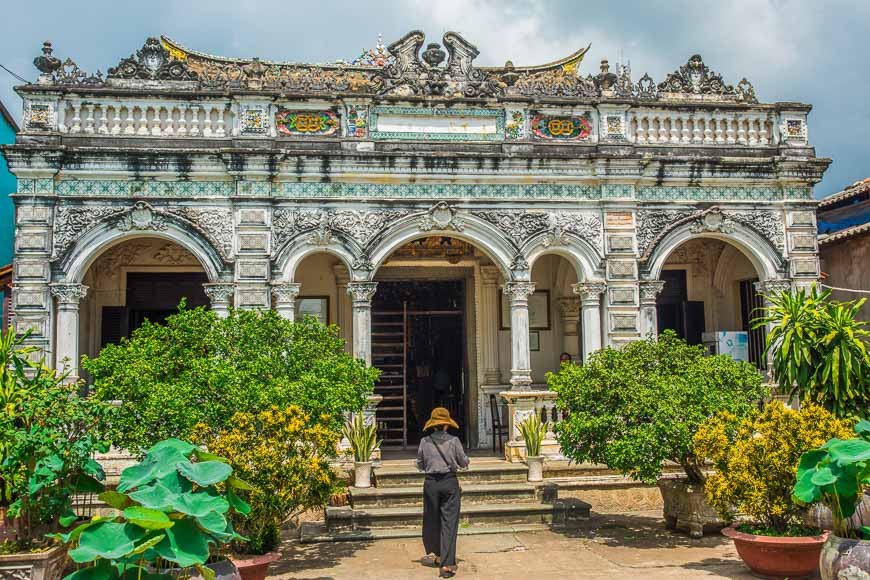
The name ‘Sa Dec’ holds romantic connotations for many visitors. After all, this is where French author Marguerite Duras lived and set her breathtaking novel, ‘The Lover’. The house of Duras’ lover, Huynh Thuy Le, is still standing today and is open to the public. The house is a treasure trove of nostalgia. Dating back to 1895, it’s decorated with antique furniture, stained-glass windows, and painted cement tiles. The story of Duras’ family and her complicated relationship have put Sa Dec forever on the literary map. But beyond the house on Nguyen Hue St., Sa Dec has countless mansions and ornate temples on its tidy riverfront streets. Stroll the streets along the river to appreciate the town’s architectural gems.
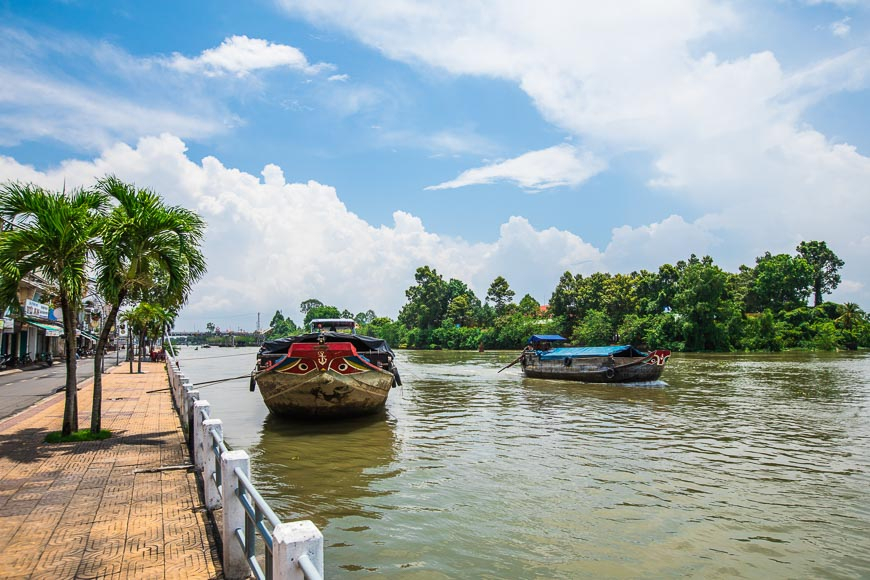
The market is the centre of activity in Sa Dec, and is full to bursting with intriguing produce. The back of the market extends to the water, where boats can easily come and go. Only a few kilometres outside the city, is another colourful attraction. Sa Dec’s extensive flower nurseries nurture thousands of tropical plants in greenhouses. You can walk through these greenhouses and nurseries, or take pictures in special stations designed for Instagrammers. Sa Dec is one of the quieter towns in the Delta, but it’s lovely flower farms and lingering colonial influences have a way of charming travellers passing through.
Ben Tre
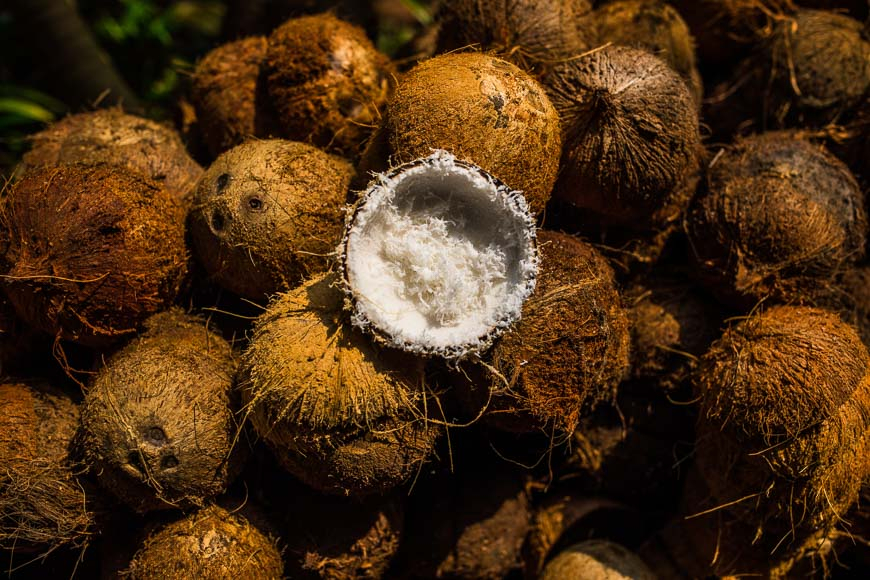
Ben Tre is one of the towns nearest Ho Chi Minh City, and because of this it’s an easy place to see on a day tour. However, like every Mekong Delta province, Ben Tre has its own share of secret spots where you can easily hide away in a riverfront homestay for several days. Whether you’re coming for a quick trip or a longer retreat, Ben Tre delivers treasures in each moment. A boat ride along the nipa palm-fringed canals is a great way to go. Most boat tours stop at a coconut candy workshop, where you can taste as much coconut candy as you like while you watch the process from harvesting to packaging.
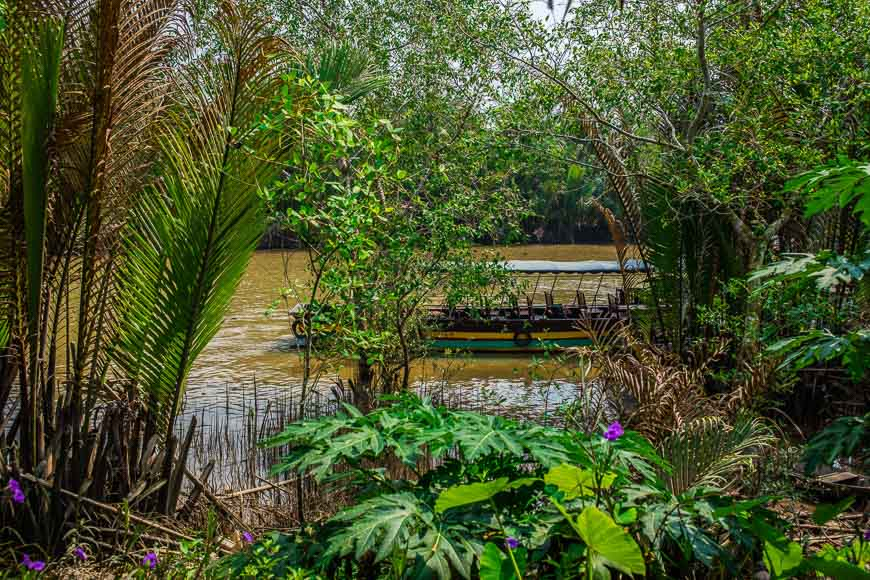
Quiet roads and lanes encircle the town, leading into the countryside. Hop on a bicycle to go deeper into this tropical wonderland, full of towering palms and olive-hued canals. You can spend your time watching how weaving is done to create colourful mats, visit a brick making factory to see bricks formed and fired in huge kilns, or clamber onto a sampan for a relaxing row boat tour on the water. The highlight of any day here is of course the food. Treat yourself to a classic Ben Tre lunch of fried elephant ear fish, rolled with cucumber, pineapple, herbs and rice noodles, and dipped into light fish sauce.
TIP: If you have only a day to visit Ben Tre, book your trip with local provider SaigonTourist. The tour includes transfers from Ho Chi Minh City, two boat rides, a visit to an ancestral house in the countryside, and an amazing lunch. Their well-trained, English-speaking guides will guide your exploration from start to finish.



